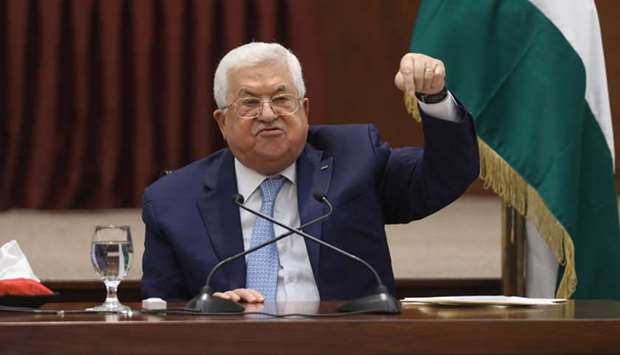Palestinian president Mahmoud Abbas has warned that Israeli annexations in the occupied West Bank would spell the end of all security co-ordination, as international opposition to the plans grows.
Palestinians say any annexation would put an end to their hopes of an independent state alongside Israel, the so-called two-state solution.
In a speech late Tuesday, Abbas said the annexation plans showed Israel was no longer abiding by peace accords between the two.
As such, he said, the Palestinian government was “absolved, as of today, of all the agreements and understandings with the American and Israeli governments and of all the obligations based on these understandings and agreements, including the security ones.”
Abbas did not go into detail about the implications of such a step, but it is his strongest card as he seeks to pressure Israel to hold back.
Mahmoud Aloul, vice-president of Abbas’ Fatah party, said that implementation of the decisions would be finalised in the coming days but “as of last night all communications with the Israeli side, including security co-operation, were stopped”. Abbas, 85, has been in power since 2005 and has made multiple previous threats to end security co-operation with Israel without following through.
A genuine end to such co-ordination could jeopardise the relative calm in the West Bank, where 2.7mn Palestinians live alongside more than 400,000 Israeli settlers.
Israel controls all access to the territory where Abbas’ government is based and even basic tasks require co-ordination between the two sides.
Abbas even needs co-ordination to travel from Ramallah, where the government is based, to any other Palestinian city.
Tareq Baconi of the International Crisis Group think-tank said the Palestinian leadership had provided little clarity about what ending security co-ordination would mean.
“The impact isn’t just freedom of movement, it is everything, even where food supply lines come from,” he said. “It can’t be dismantled overnight.”
In reality, he said, Abbas was seeking to build pressure on Israel to tone down annexation plans.
Hugh Lovatt, Israel-Palestine analyst at the European Council on Foreign Relations, agreed.
“We have been here before, many times. Abbas has yet to follow through, emptying such threats of any potential deterrence,” he said.
“Yet, as annexation looms, his declaration should nonetheless be interpreted as one last desperate shot across the bow.” Netanyahu has been emboldened by the staunch support of President Donald Trump, whose controversial peace plan released in January gave Israel US blessing to annex swathes of the West Bank.
US Democratic presidential nominee Joe Biden on Tuesday came out against Netanyahu’s plan to apply Israeli sovereignty to Jewish settlements and the strategic Jordan Valley, which makes up around 30% of the West Bank.
Under the coalition agreement Netanyahu signed with rival-turned-partner Benny Gantz, the two can bring annexation to cabinet for discussion from July 1.
King Abdullah II of Jordan, warned last week annexation would put Israel on course for a “massive conflict” with his country.
The UN’s special Middle East envoy yesterday called on Israel to “abandon threats of annexation”.
“The continuing threat of annexation by Israel of parts of the West Bank would constitute a most serious violation of international law,” envoy Nickolay Mladenov warned a meeting of the Security Council.
Mladenov said he would speak today with Palestinian leaders about the practical consequences of their announcement, which were not spelled out by Abbas.
The European Union, Arab League and individual European governments have also come out in firm opposition to the annexation plans.

Palestinian President Mahmoud Abbas speaks during the leadership meeting at his headquarters in the West Bank city of Ramallah.
